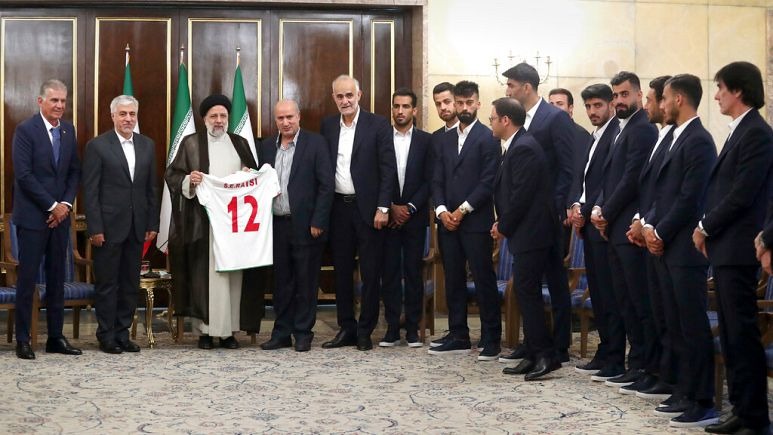When the starting whistle sounded in Qatar for the Iran-England match, many in Iran looked closely and were not disappointed: there was a gesture of support for the protesters.
For many people in Iran, hope had already died to see a sign from the actually very popular national football team.
But then a silent protest took place: When the Iranian national anthem was played in the stadium, the entire team remained silent. For this, the players were praised on the net.
It is not entirely clear how spectators in Iran will be able to follow the games: no sports reporters have been sent from Tehran to Qatar and the game will be broadcast on Iranian TV with a delay so that the transmission can be interrupted at any time.
Clearly, numerous people have been severely disappointed since the national team met President Ebrahim Raisi on 14 November. On social media, journalist Golineh Atai writes that there is a lot of ridicule for the players in Iranian society – especially for those who bowed to Raisi.
Atai quotes an Iranian who wrote: “If you kicked a mullah turban instead of a football on the field – I guarantee you: 80 million Iranians would watch!”.
In addition to protests across the country, some are demonstrating their anger towards the Islamic Republic’s government by pushing clerics’ turbans off their heads in Iran. Numerous videos on the internet show the actions.
“It is bitter that a national team loses to the people of your own country BEFORE a World Cup. Even if you become world champions – you have already lost,” Atai quoted another commenter as saying.
“It is bitter that a national team loses to the people of their own country BEFORE a World Cup.
Even if you become world champions – you have already lost.” pic.twitter.com/WpVyrzEOzd– Golineh Atai (@GolinehAtai) November 16, 2022
What form of protest could there be?
One form of protest that is expected, at least by some players, is not singing the national anthem. It could also be that one or the other cuts or shaves off their hair as a sign of soldiarity, or that a goal is not cheered.
There is also discussion on social media that it is possible to see protest on the part of the spectators. It is said to have been agreed to shout Mahsa Amini’s name at a certain point. The death of the young Kurdish woman in police custody in September had triggered the protests.
However, players who protest can expect to get into trouble in their home country or even be banned from the team. When climber Elnaz Rekabi appeared in South Korea in October without a headscarf, she returned to Iran earlier than planned, apologised and then disappeared from public view.
“Our people are unhappy” – a sign from Iran’s captain?
At a press conference on Sunday, the captain of Iran’s national team, offered his condolences to the families in Iran.
“We have to accept that the conditions in our country are not right. Our people are not happy. We are here, but that doesn’t mean we shouldn’t be their voice or that we shouldn’t respect them. Everything we have is there for them and we have to fight; we have to do our best to score goals and present results to the bereaved people in Iran. I hope that conditions will change and people’s expectations will be met,” said Ehsan Hajsafi.
